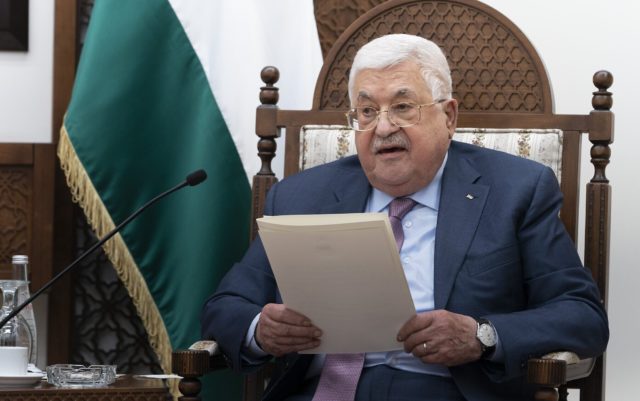
In December, the Biden administration quietly proposed a five-government summit to enhance prospects for the “two-state solution” it promotes as key to Middle East regional security. Israel, Jordan, Egypt, the Palestinian Authority and the United States would meet to discuss, discuss … discuss … what?
Israel apparently waited several months to see if something useful would materialize but has now said it will not participate. No surprise. Negotiations work best; in fact, they work only when the parties have a common endgame. Hashing out the mechanisms, concessions, policies, gains and losses is the way to get to an agreed-upon future. These five governments have no common view.
Israel sees the future in the Abraham Accords. Egypt, and even Jordan, recognize that Accords countries (plus, Saudi Arabia and a few others that are close but not yet there) have a plan that includes economic, social, political and security gains for all the parties. Most recently:
- A free-trade agreement between Israel and the United Arab Emirates;
- An Israeli orchestra played in Egypt;
- MoUs by an Israeli tech delegation in Morocco;
- The renovation of a Moroccan Jewish cemetery;
- Israel’s Independence Day being marked (as a holiday!) in Bahrain and Morocco;
- A security agreement and air overflight rights between Saudi Arabia and Israel;
- Israel’s participation in CENTCOM plans and exercises to secure the Red Sea.
War among them is a relic of the past.
The Palestinian leadership, however, insists that the past is not only the past, but also the present and the future. Oddly, President Joe Biden and the U.S. State Department are doing nothing to disabuse them of the notion.
Palestinian Authority leader Mahmoud Abbas has rejected the concept of Israel as a Jewish state; announced that the P.A. had severed relations with Israel, including security relations (which lasted only until his own security forces made it clear that the Israel Defense Forces was necessary to prevent Hamas from overrunning the West Bank); and told the U.N. General Assembly that Israel “has one year to withdraw from the Palestinian territory it occupied in 1967, including East Jerusalem.”
What are the five supposed to talk about?
Jerusalem’s reasoning was straightforward. One official said Israel is not interested in a “photo op” that results in an “expectation crisis.” Another told journalist Barak Ravid that “past experience taught us that such an expectation crisis could lead to an escalation on the ground.”
And there is already plenty of escalation on the ground.
Earlier this month, ahead of Biden’s planned visit to the region but after discussions about a conference, the P.A. announced it was considering “suspending its recognition of Israel.” Perhaps forgetting he had already announced an end to recognition of Israel last year, the ever-ungrateful Abbas listed “requirements” for a meeting with Biden-to say nothing of what he would expect to be paid for a meeting with Israeli officials:
- reopening the U.S. consulate in Jerusalem;
- removing the PLO from the U.S. list of Foreign Terrorist Organizations;
- reopening the PLO mission in Washington which was closed during the Trump administration.
All steps to the past. Anticipating failure, perhaps, a Palestinian source said: “If President Biden intends to come to the meeting with [Abbas] offering only a modest economic relief package, then it is better that he not come at all.” OK. It appears he’s not.
And why would Egypt even contemplate attending? The P.A. at least received bribes for its presumed participation, including hundreds of millions of dollars carefully slipped between the cracks of the bipartisan Taylor Force Act. Egypt was shown the back of the administration’s hand as the State Department announced that it was removing Egypt’s Gama’a Islamiyya organization from the Foreign Terror Organizations list. They’re the ones who recruited the killers of Anwar Sadat, and in 1997, carried out the Luxor massacre, killing 62 tourists from around the world. State did not ask Egypt’s opinion.
Egypt and Israel have worked together to reduce and eliminate terror organizations in the Sinai; share the view that Iran is the primary threat to the region; and view Iran’s proxy Hamas in Gaza as the smaller but closer threat. They have joint interests in the promotion of natural-gas extraction in the Eastern Mediterranean. Egypt is happy finally to have Arab acceptance of Anwar Sadat’s decision to make peace with Israel in 1979. Israel is happy about that as well.
And Jordan? King Abdullah II has come to fear Hamas—as he feared the PLO in the late 1960s and early 1970s before Israel protected his father from Syrian support for the Black September uprising. And the king fears Iran—Shi’ite, hegemonic, sponsoring militias and close by. Nasty as he has been of late, Abdullah is not stupid. Aqaba, Jordan’s outlet to the Red Sea, is Jordan’s only direct outlet to anywhere. Iran and its Houthi proxy threaten that. Israel is a lifeline.
It isn’t surprising that the P.A. looks to an imagined past as its model. It is wasteful in the extreme for the president of the United States to indulge such thinking while ignoring the fact that the region has moved on in a positive and constructive manner.





